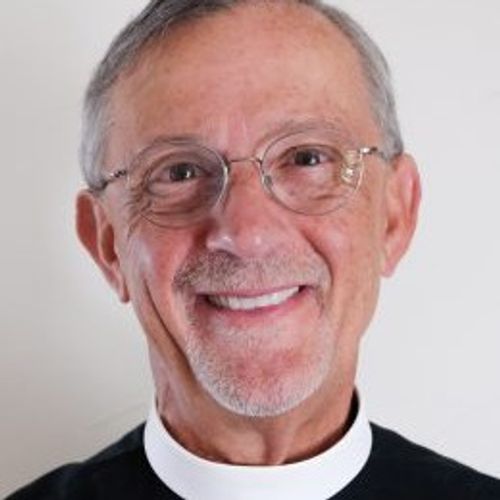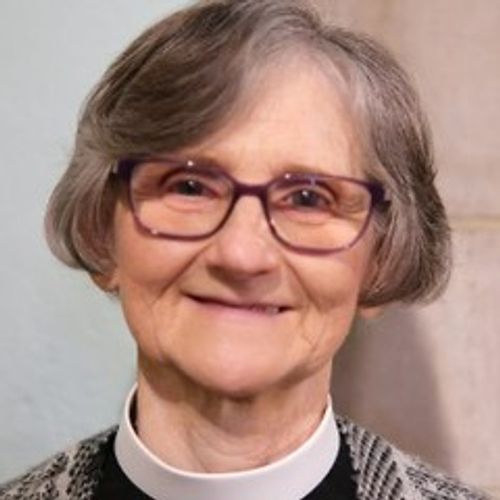Spirituality & Social Justice with Bishop Bob Ihloff
Spirituality & Social Justice with Bishop Bob Ihloff
We are honored to have the Rt. Reverend Robert W. Ihloff, recently retired after serving 28 years as a bishop of the Episcopal Church. Bob speaks about how his spirituality has inspired and maintained his decades-long passion for social justice issues.
Highlights:
00:00 Spirituality & Social Justice with Bishop Bob Ihloff
00:18 Introduction
01:31 Social Justice & Spirituality: The Common Thread of Bishop Bob's Ordained LIfe
03:44 Challenges of Prophetic Preaching
07:16 Differences in Being a Parish Priest and Diocesan Bishop
09:44 What has surprised you?
11:56 How has spiritual direction shaped your ministry?
14:46 Being a Spiritual Director Again
17:30 The Future of Christianity
21:15 How to Contact Bishop Bob
21:54 Thanks
Resources mentioned in this episode:
Bishop Bob's Personal eMail address: rwihloff@gmail.com
Listening for Clues is pleased to present our new series, "Good News!" featuring weekly conversations with people who are making a difference, large or small. We want everyone to know what they are doing, why they are doing it, and how. So, our listeners and viewers can experience the good news and go out and make a difference themselves.
Listening for Clues invites you into conversations that discover clues, rather than solutions to life’s problems. Join the journey with Jon Shematek and Lauren Welch, Episcopal deacons, as we explore whatever lies ahead. Check our website Listening for Clues.
© 2025 Listening for Clues
Transcript
Hello
Jon:welcome to Good News being brought to you by Listening for Clues.
Lauren:We are Lauren Welch and Jon Shematek, deacons in the
Lauren:Episcopal Diocese of Maryland.
Jon:We sure are ,today we have a very special guest,
Jon:the Right Reverend Robert W.
Jon:Ihloff, who is a bishop in the Episcopal
Jon:Church.
Jon:Bob served 28 years as a parish priest in three dioceses, followed
Jon:by 28 years as a Bishop of Maryland.
Jon:He was formerly a member of the House of Bishops Theology Committee, President
Jon:of Province 3, a trustee of the Virginia Theological Seminary, and of the
Jon:national Board of Episcopal Schools.
Jon:He's currently offering spiritual direction.
Jon:Bob has been married for 57 years to the amazing Nancy V.
Jon:Ihloff.
Jon:They have two children, six grandchildren, and one great granddaughter.
Jon:Nancy and Bob live in Baltimore, Maryland.
Jon:Welcome, Bob.
Jon:It's good to have you today.
Bob:Thank you.
Bob:It's very nice to be here with you, both of you, who I admire
Bob:greatly and think the world of.
Bob:So thank you for inviting me.
Lauren:So, Bob, to begin with, you have been in ordained ministry for 56 years.
Lauren:Share with us what the thread through those years has been.
Bob:The thread for me, at least, has been the interface of
Bob:social justice and spirituality.
Bob:This started very early in me.
Bob:I became very involved in the civil rights movement when I was in college in the
Bob:60s and seminary also in the 60s, and I fortunately went to Episcopal Divinity
Bob:School in Cambridge, Massachusetts, which was at the time the only seminaries
Bob:that really encouraged students to get involved in the social issues of the day,
Bob:and As I studied scripture and immersed myself in the Civil Rights Movement,
Bob:I became more and more convinced that Jesus was, among other things, very
Bob:interested in justice and civil rights.
Bob:And I also became aware that there were people in the Civil Rights
Bob:Movement who were burning out.
Bob:Because they were constantly giving of themselves, but they weren't
Bob:getting spiritually replenished in what was an arduous and
Bob:long, and still going on, fight.
Bob:And so I began even as a seminarian to turn my attention to how to remain
Bob:spiritually alive and be grounded in spirit so that I would have the energy
Bob:to be involved in social justice and...
Bob:That has been a thread that I have carried through to the present day,
Bob:including my interest in providing spiritual direction for folks.
Bob:I have been in spiritual direction myself for years, and part
Bob:of that has been a necessity.
Bob:If you're going to also be involved in the issues of the day, you need to
Bob:have a spiritual grounding, so that you don't run out of energy and burnout.
Bob:Or lose touch with why you're doing this to begin with.
Jon:Well, having heard a number of your sermons over the years, I, I would say
Jon:you have been extraordinarily faithful to, to that whole precept of the
Jon:thinking of the Jesus movement as being a social justice definitely been a very
Jon:strong kind of a prophetic preacher.
Jon:I wonder, has that.
Jon:At times presented any difficulties?
Bob:Yes, of course.
Bob:But I, over the years have developed a pretty thick skin.
Bob:It was very helpful to me that the first rector I worked with.
Bob:in New Britain, Connecticut, who was also deeply involved in social justice . One
Bob:of the things he mentioned to me early on in my ministry was, it's important
Bob:to decide who you want as your enemies, probably as important as it is who
Bob:you want as your friends, because you're not going to please everybody.
Bob:And that hasn't meant that I have thrown caution to the wind or been for the most
Bob:part in my ministry, purposely difficult with people with whom I disagree.
Bob:I actually invite disagreement and I often.
Bob:inform people who have a different points of view that I value hearing their
Bob:points of view because it stretches me.
Bob:It gets me to be more concrete in what my own beliefs are, but I also think that's
Bob:how we grow as we challenge each other.
Bob:And so I've sought.
Bob:to be a challenger in a good sense of trying to work with people, because
Bob:I do think that diversity is really important, and people paying attention
Bob:to other Christians, especially other Christians, but other people's
Bob:points of view are very important.
Bob:Over the years I've had any number of people who have taken issue.
Bob:Because I do tend to foster a prophetic voice.
Bob:Not everyone is given that voice.
Bob:I feel like that has been something that God prompts me in.
Bob:And I try to not be political in utilizing that voice.
Bob:I mean, the irony is we now live in an age where almost anything you say is likely to
Bob:be perceived as political by someone else so I try to be very clear that I'm coming
Bob:to this from my own Christian belief.
Bob:Jesus spent a disproportionate amount of his time with the poor,
Bob:the marginalized the disadvantaged.
Bob:And that in itself, I think, causes us to take seriously that that's an important
Bob:part of what God is interested in.
Bob:And part of living into the kingdom of God, which is the bringing together of all
Bob:people and creating even playing fields and justice is working among those who are
Bob:particularly disadvantaged to give them a leg up and to enable them to be rich
Bob:parts of the dialogue that needs to go on.
Bob:When I was first ordained I learned that it was also important
Bob:to establish my credibility as a dependable and caring pastor.
Bob:And so in parishes, as well as in the Diocese of Maryland, I have always.
Bob:Making, trying to make it very clear and throughout my ministry, making it clear to
Bob:people that I really do care about them.
Jon:Bob, I wonder if I could follow up just a little bit on this, because
Jon:you raised a curiosity for me just now, and thinking about, you had sort of an
Jon:equal number of many years as a in parish ministry and in diocesan wide ministry.
Jon:I just wonder how did that differ in those two roles in terms of getting
Jon:the social justice message out?
Bob:The roles are quite different, although I felt that many of the
Bob:things that I did as a parish priest prepared me to be a bishop.
Bob:The two roles are quite different, and that was why I was reticent
Bob:about being considered as a bishop.
Bob:I, I never applied to be a bishop anywhere, and my name spun out of the
Bob:computer in New York, which houses all of the resumes of clergy throughout the
Bob:country, to be Bishop of Maryland, and It was not a job I would have ever sought,
Bob:but as I read the profile, I decided they were looking for somebody who had many of
Bob:the same experiences and commitments that I had, and I felt that I couldn't in good
Bob:conscience just say, no, this isn't right.
Bob:Thank you.
Bob:This isn't the will of God, I'm going to stay a parish priest.
Bob:But quite frankly, I was very worried when I was elected that
Bob:I wouldn't enjoy being a bishop.
Bob:And it has turned out that I can't say I like being a bishop more
Bob:than a parish priest, but I have liked them equally and in different
Bob:ways, and for different reasons.
Bob:But the commonality has been that in both cases, these gave me wonderful
Bob:opportunities to really try to Preach the gospel in a variety of different places
Bob:and to learn from different people.
Bob:One of the things that interested me most about Maryland is that as
Bob:one of our former governors said, Maryland is America in miniature.
Bob:And I think that's true.
Bob:It includes one of the great cities of the world, Baltimore.
Bob:It includes white collar cities like Frederick and Annapolis, and
Bob:blue collar cities like Hagerstown.
Bob:And Cumberland, and lots of suburban areas, and lots of rural areas still.
Bob:And, of course, we include two counties in Appalachia allegheny County, and
Bob:Garrett County in recent years Bishop Sutton asked me if I would take particular
Bob:responsibility for our Appalachian region.
Bob:And I have loved that.
Lauren:So Bob, with all that you've done, the challenges and the prophetic
Lauren:words that you have spoken what has surprised you in your ministry?
Bob:For my whole adult life, I have been pleasantly surprised at
Bob:where I find the Holy Spirit and in whom I find the Holy Spirit.
Bob:As a young priest, I often went off to hospital situations or in to visit
Bob:someone at home with a great deal of anxiety about what would I say, what
Bob:would I do, how would I minister to them.
Bob:Rapidly, it became aware, I became aware that ministry is always a two way street.
Bob:That I may go to do something in relationship to someone, but invariably
Bob:they minister to me in a very deep way.
Bob:As anyone who does hospital ministry knows, there are situations where I
Bob:have felt I was standing on holy ground.
Bob:It was almost as if, in a Genesis kind of sense, I should remove my shoes
Bob:because the ground was so holy by the witness that the person who was dying
Bob:or was extremely ill was making and the ways in which that enhanced my life.
Bob:So, God constantly does surprise me, although now I expect to be surprised.
Bob:It used to be a full surprise when I was younger.
Bob:I am not surprised particularly, but it always takes me off guard.
Bob:God is in situations...
Bob:where I haven't expected God to be profoundly.
Bob:And anyone who relates to people, I think, and does so from a religious
Bob:perspective, has those experiences.
Bob:They are wonderful experiences.
Bob:They, they give us a lot of nourishment and enable us to
Bob:go on through tough situations.
Bob:Because the relationship creates a space where the Holy Spirit is really
Bob:at work, and that is a very, very humbling and, and uplifting experience
Jon:I think the the relationship word has popped out in all of these
Jon:good news conversations that we're having, because I think it really is.
Jon:underpinning of what our spiritual life is about relating with
Jon:divinity and with one another.
Jon:And I was just wondering a little bit more, you'd mentioned earlier about
Jon:how spiritual direction has been a part of your life just wondering if
Jon:you could expand a little bit more on the role of spiritual direction in
Jon:informing your decisions forming your ministry, informing that, keeping that
Jon:passionate fire alive that you have.
Bob:You're right, Jon, that relationship is at the very heart of this.
Bob:And I think relationship is directly related to the concept of incarnation.
Bob:The unique feature of Christianity...
Bob:is the belief that God so loves the created world and particularly human
Bob:beings who have been created that God comes into our experience in the
Bob:person of Jesus, born and raised as a human being with all of the faults
Bob:and foibles that human beings are subject to in a world in which God
Bob:gives up power to become a servant.
Bob:This is a profound statement.
Bob:of God's love for us and calls us into relationship.
Bob:I've often surprised confirmation classes before I confirm members by
Bob:saying, you know, it's not possible to be a Christian by yourself.
Bob:I mean, It is never just me and Jesus.
Bob:Important as a relationship with Jesus is, it is always in a community, it is
Bob:always a brotherhood and sisterhood, a relational experience that we both
Bob:experience God and we also grow into being better persons with others.
Bob:And so spiritual direction comes right out of that.
Bob:And I, am very, very interested in relationships.
Bob:And when I moved to the Boston area, took two years of intensive study
Bob:with the Boston Gestalt Institute, thinking that God might be calling me
Bob:to be a pastoral counselor, which is something I also love but at the end
Bob:of the training, I decided that no, I preferred to remain a generalist
Bob:because I, I couldn't say that I loved.
Bob:counseling more than I love preaching or teaching or Bible
Bob:study or various other things that parish ministry involved me in.
Bob:The next thing I did in that same period in the 1980s was to enter a
Bob:Doctor of Ministry program and that was in the area of spiritual direction.
Bob:Now that I'm retired, I can go back to doing this, and it is a very
Bob:privileged thing to kind of walk the spiritual journey with other people.
Bob:And I find it very enlivening for myself, but I think it's also possible
Bob:that through my own experiences, people will find their spiritual journeys.
Bob:And when I say spiritual journeys, I don't mean that those journeys
Bob:are somehow isolated in some esoteric way from our regular lives.
Bob:We walk our spiritual journeys in the context of living day to day,
Bob:in the context of what we do and how we behave and how we treat people.
Bob:What causes we...
Bob:Support, how we spend our money the list is almost endless of how the
Bob:spirit can inform us about how to live.
Bob:And so spiritual direction is an opportunity when it's done one on one
Bob:for a person to meet with the director.
Bob:I don't like the name director because it implies something that
Bob:isn't true in spiritual direction.
Bob:The direction comes from the Holy Spirit.
Bob:If we're being honest.
Bob:And so my job as the spiritual director is try to listen carefully to the directee.
Bob:and hear where the spirit is either calling to that person or perhaps
Bob:calling to me through my hearing of what the person is saying.
Bob:So it is not particularly directional in that I don't tell people what to do.
Bob:I instead it's my job to come up with important questions where they hopefully
Bob:can have an aha from within themselves.
Bob:Probably most of the answers any of us need to know about life are inside of
Bob:us, at least if we've lived for a few years I currently do not have anyone who
Bob:is non Christian, but I would, I would offer that because I can be sensitive to
Bob:person who, the person would pretty much have to have a, a religious connection
Bob:because I am a religious person who takes God seriously, but I don't for a minute
Bob:think that God only works with Christians.
Bob:So I would certainly welcome Followers of Islam, or Judaism, or Buddhism, or
Bob:Hinduism into that kind of direction too.
Bob:I think we can learn from each other, and it's the same spirit
Bob:that is guiding all of us anyway.
Lauren:So, as we wrap up here, Bob, is there anything else you
Lauren:would like to share with us?
Bob:,I think for Christians in our own culture, we are looking
Bob:at a somewhat scary, but I think very hopeful phenomenon.
Bob:And that is that we've already entered, into a new phase of what
Bob:Christianity is going to look like and what it's going to be.
Bob:I think what we are going to see more and more of is people who take the
Bob:gospel seriously as the gospel of love.
Bob:are going to hopefully jettison some of the ways in which
Bob:Christians have been offensive.
Bob:And not the least of that is the ability to welcome people
Bob:of different points of view.
Bob:We will have people who, for whatever reason, justifiably
Bob:or not, drive us crazy.
Bob:But they are part of the household of God, and they need some respect,
Bob:and they need to be listened to.
Bob:And that for me is very exciting because I think if we can learn to do that most
Bob:of what I've learned in life that has really been important, I've learned
Bob:from people who are different from me.
Bob:Different skin color, different background, different socioeconomics,
Bob:different educational backgrounds, or no educational background.
Bob:I would have nothing in common with.
Bob:And the Holy Spirit has provided.
Bob:The commonality and, and avenues to grow and to really cooperate in community
Bob:so that the church I believe in for the future is a church in which the
Bob:litmus test will not be what you believe or how you present the faith in a.
Bob:written and or verbal sense, but how you live the faith.
Bob:How do you, in your daily life, witness to a God who is loving and who has called all
Bob:of us to be brothers and sisters and into one family that finds that love undercuts.
Bob:The other things that divide us, so that it's possible for people who
Bob:are vastly different to have a love and respect for each other, despite
Bob:their difference I think it's not God's will that we should be uniform.
Bob:It is God's will that we learn to love one another despite differences
Lauren:You are describing what I believe Christianity is and just calling
Lauren:us at this time in our culture, in our lives to make love the prime goal
Lauren:with one another in our relationships and with ourselves in creation.
Lauren:So, you know, I think that was just...
Lauren:Perfect.
Lauren:Thank you.
Lauren:Thank you for sharing that.
Bob:And I think that's that's where Christians need to think of love, is not
Bob:so much an emotional reaction to someone as a, Intellectual decision to honor that
Bob:person as a loved child of God and to realize that if God can love that person,
Bob:maybe I can learn to do that as well.
Lauren:Love takes a lot of work.
Bob:Yes, it does
Jon:to which we can only say Amen.
Jon:Amen.
Jon:And Bob, this has been great.
Jon:We've really enjoyed having you with us today.
Jon:I just wanted to ask you are now Retired once again, and maybe for
Jon:the final time, retired as bishop?
Bob:I think this is my last official retirement, in that I'm quite content to
Bob:be doing spiritual direction with folks.
Bob:And I will undoubtedly be asked to come and preach and do things, and
Bob:I will accept that as long as I'm physically able to do that kind of thing.
Jon:If anyone who's listening or watching is interested in contacting
Jon:you about spiritual direction or what have you, Is there an address
Jon:or a website we can point to?
Bob:Yes.
Bob:The easiest way, and I'm happy to, and I'm seeing both laypeople and clergy, so this
Bob:is not just a clergy phenomenon the best way to reach me is by writing my personal
Bob:email, which is RW iHLHOFF@GMAIL.COM
Jon:we will put the correct email address in the show notes.
Jon:So if people are interested, you can find those there at any time.
Jon:And once again, Bob, thanks so much for being with us today.
Bob:Thank you, Jon and Lauren.
Bob:Thank you.
Bob:You know, as you know, I think the world of you both, and I've
Bob:had a long, long relationship.
Bob:I mean, really, essentially 28 years with both of you.
Bob:And that's been a lot of fun.
Bob:It has.
Bob:It has.
Bob:And it goes on.
Bob:It does.
Bob:Thank you.
Bob:Sure thing.
Lauren:It's been delightful, Bob.
Lauren:Thank you for being with us.
Lauren:Jon and I also want to thank all who are watching and listening.
Lauren:We cannot do this without your participation.
Lauren:So please take a moment to comment, like, and share on all
Lauren:your social media platforms.
Lauren:This will help us spread the good news to even more people.
Lauren:And again, thank you for the gift of your time with us today.
Lauren:Until next time, peace and blessings.
Lauren:Good news is being brought to you by Listening for Clues.
Lauren:You can find us on our website, listeningforclues.
Lauren:com, our YouTube channel, our Vimeo channel, and just about every
Lauren:podcast platform that there is.





